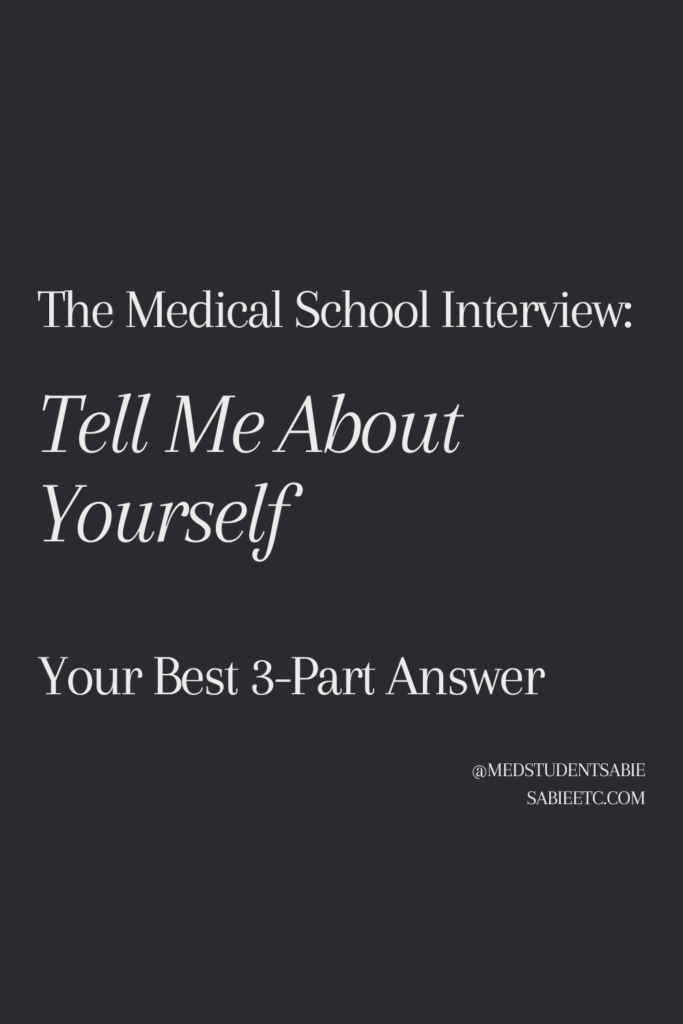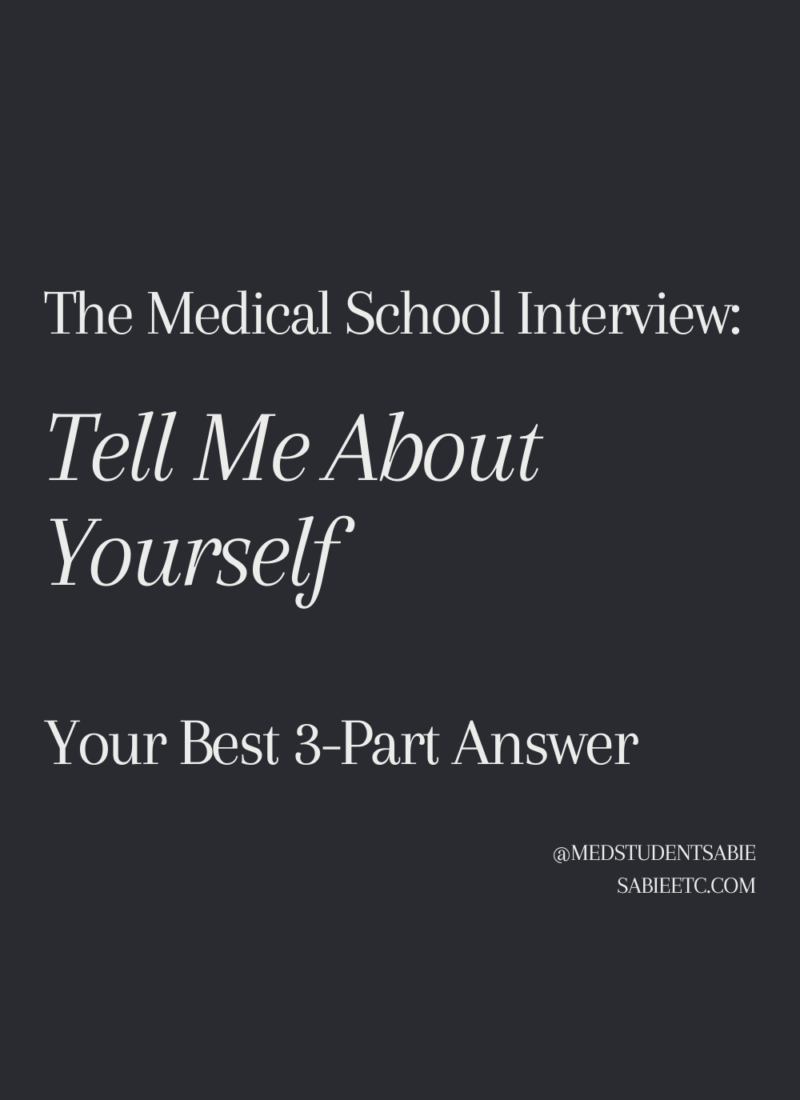“Tell Me About Yourself” is probably the most common question you will see amongst your interviews. It’s also usually the first question you’ll be asked which will really set the tone for the meeting moving forward. So how do you make sure you start out on a high note? Read on to find out.
I love the medical school interview. I was never the best writer and always felt more confident in my verbal communication skills. I was excited to meet the students and faculty and excited for them to meet me for who I am beyond my written application. The medical school interview is an opportunity for applicants to really shine and I believe every applicant can accomplish this.
This post is all about how to answer the medical school interview question, “Tell me about yourself.”
Medical School Interview | How to Answer “Tell Me About Yourself”
You should view your answer to this question in thirds and budget your time accordingly. I think spending about a minute on each section is fairly reasonable. Given the broad nature of this question, a three minute-ish answer is appropriate. Remember that this answer doesn’t have to be consumed by medicine. I structured mine in a way that progressively gets more “medical school” related. In the three parts below, I include transcripts of how I formulated my answers as an example. Keep in mind this is one way to do it, but there are an infinite number of ways to answer this question!
Part 1: Pre-College
If you ask a hundred medical school applicants how they answered this question, you’ll get a hundred different answers because it is supposed to be a very personal question. I think the most logical way to format your answer is chronologically, so start from the very beginning. You can talk about where you grew up and maybe some things you were involved in as a child or your family or high school activities. I think it adds a personal, very human, touch to this answer. It doesn’t hurt to mention a few things that may lead into your next section or that you can use to transition into your college years. I definitely kept this section of my answer more lighthearted. The interview, while it should be handled professionally, doesn’t have to be this dark and intimidating conversation. You should enjoy the medical school interview. I’ll show you how I described my pre-college years here:
“I was born in ___ where I lived for nine years before moving to ___ for my middle school years. I was involved in Girl Scouts and started my first business while I was in middle school, the Babysitters Club of X Town, where I managed a group of babysitters, set up initial home visits with potential clients, and created different marketing strategies. My parents like to joke that this was the start of my entrepreneurial career. In high school, our family moved to California where I decided to take up water polo, a sport I had never heard of. I also had no history of being athletic, in fact I would say probably the opposite. By my senior year, I was captain of my team. Through sports, I really fell in love with health and fitness which led me to…”
RELATED POST: Medical School Interview | What Not to Wear
Part 2: College
I would be careful with what you choose to talk about here. Make sure that it’s not a repeat of exactly what is on your medical school application. Unless the interview is a blind interview (where the interviewer has not seen your written application), they already know what you were involved in during college. I would highlight a few things here, no more than three, that really impacted you and explain a little bit about what led you to do that activity and how it impacted you, briefly. I say briefly here because it is likely that you will go into greater depth regarding your college activities later on in the interview. Here is how I crafted this portion of my answer:
“Through sports, I really fell in love with health and fitness which led me to major in sports medicine at X University. After my freshman year, I went on a summer medical service trip which is where I really solidified my desire to become a physician after shadowing the attending physician in the rural clinic there. I also minored in Spanish. Learning Spanish has always been a passion of mine since growing up and participating in service trips to Tijuana, Mexico a few times a year in high school. I was able to use these skills to lead trips to serve with X non-profit in Guatemala during my sophomore and junior years. I worked as a teaching assistant for most of my college career and really discovered my passion for teaching. I knew that I wanted to be in a career that would give me the opportunity to be an educator. After graduating, I wanted to apply my degree in a clinical setting so…”
RELATED POST: 5 Commonly Asked Medical School Interview Questions You Need to Prepare
Part 3: Post-College
Everyone’s path to medicine is different, some will take gap years and some won’t. However more and more applicants are taking gap years so this is where I think giving a brief overview of your gap year activities is appropriate. Similar to the last section, keep it brief as you will likely elaborate on these topics later in the interview. Here is how I build this portion of my answer:
“After graduating, I wanted to apply my degree in a clinical setting so I accepted a position as a medical assistant at a sports medicine private practice in the Bay Area. After spending a year there, I wanted to work in a more community-based setting and in a field of medicine with a greater variety of cases. I was fortunate enough to land my dream position as a medical assistant at a community health clinic in San Francisco. I was inspired by the complexity of managing healthcare for the patient population we worked with and knew that as a physician I wanted to work in this type of setting. After working there for a year, I decided that it was time for the next step of applying to medical school.”
RELATED POST: Why This School | Common Medical School Interview Questions
Again, I encourage you to keep your answer around three minutes and divide it equally amongst these three sections. Keep things somewhat brief, as the important things you will go into greater depth in more targeted interview questions. This is just one way to craft your answer, but it is not the only way. This question, like your personal statement, is an opportunity for you to be creative and present yourself to the admissions committee any way you want to.
This post was all about how to answer the medical school interview question, “Tell me about yourself.” Definitely prepare this question in advance so you can start with a confident footing on interview day!








Leave a Reply